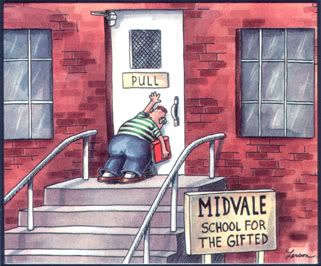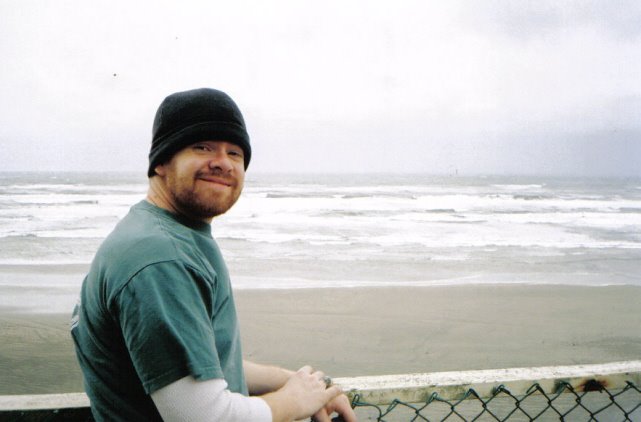Young Education.
I've been interested in politics of all sorts for as long as I've been able to chat with my grandmother about it. She moved in with my parents and I back home in North Bend around the time that I was 12. Her health was poor after decades of smoking and the recent loss of her husband. Her mind remained sharp as a blade however, and a level of humor and wit to match it made conversations with her some of my most pleasant adolescent memories. We'd talk about her favorite subjects: The Civil War, Jerry Brown, and life in rural Illinois. I would sit on my mother's twin bed that stood just aside of G. (short for Grandma) Dode's powered hospital bed for hours listening and asking questions about places like Appomattox, Sacramento and Saunemin. She was a first-rate storyteller and wrote many of her own childhood memories into short stories hoping they would be passed along for following generations.
Her death in 1994 is one I remember well, though that was a year that saw many deaths in my family. Not the least of which was my own father's with whom I also spoke with regularly. It's because of his and G. Dode's experiences that I feel a sense of seriousness for so young an age. While many of my peers played and gallivanted during high school, I worked and cared for my family at home. Writing then was a moment for me to step away from my responsibilities for a short while and the time I put into writing was never time I considered wasted. Though I regularly saw friends and had the occasional sleep-over (what kid doesn't?) they never saw my handiwork with my journals. My teachers in high school droned on about the need for completing their forms of required academia of which I found little to no interest and so incurred their ire in the form of poor marks in all areas but one: aptitude in reading and writing.
 Today I talk and listen to people that remember their moments in secondary schooling and recoil at the memories of homework, substitutes and weekend procrastination. Then I ask them what they think can make it better for students today. Usually they have little to no idea as to a method or plan for making public education better, but they do agree that the schools need more funding, teachers' salaries deserve a high percentage increase, unionizing for assured benefits is a certainty, and mandating required teaching in the arts and physical education to improve not just the students' outlook on the world but teach them to respect their own bodies are essential matters that are sorely lacking.
Today I talk and listen to people that remember their moments in secondary schooling and recoil at the memories of homework, substitutes and weekend procrastination. Then I ask them what they think can make it better for students today. Usually they have little to no idea as to a method or plan for making public education better, but they do agree that the schools need more funding, teachers' salaries deserve a high percentage increase, unionizing for assured benefits is a certainty, and mandating required teaching in the arts and physical education to improve not just the students' outlook on the world but teach them to respect their own bodies are essential matters that are sorely lacking.
Do any of us know how to make this become a reality? I can only start to imagine what it will take to say I'm certain it can be so.
Her death in 1994 is one I remember well, though that was a year that saw many deaths in my family. Not the least of which was my own father's with whom I also spoke with regularly. It's because of his and G. Dode's experiences that I feel a sense of seriousness for so young an age. While many of my peers played and gallivanted during high school, I worked and cared for my family at home. Writing then was a moment for me to step away from my responsibilities for a short while and the time I put into writing was never time I considered wasted. Though I regularly saw friends and had the occasional sleep-over (what kid doesn't?) they never saw my handiwork with my journals. My teachers in high school droned on about the need for completing their forms of required academia of which I found little to no interest and so incurred their ire in the form of poor marks in all areas but one: aptitude in reading and writing.
 Today I talk and listen to people that remember their moments in secondary schooling and recoil at the memories of homework, substitutes and weekend procrastination. Then I ask them what they think can make it better for students today. Usually they have little to no idea as to a method or plan for making public education better, but they do agree that the schools need more funding, teachers' salaries deserve a high percentage increase, unionizing for assured benefits is a certainty, and mandating required teaching in the arts and physical education to improve not just the students' outlook on the world but teach them to respect their own bodies are essential matters that are sorely lacking.
Today I talk and listen to people that remember their moments in secondary schooling and recoil at the memories of homework, substitutes and weekend procrastination. Then I ask them what they think can make it better for students today. Usually they have little to no idea as to a method or plan for making public education better, but they do agree that the schools need more funding, teachers' salaries deserve a high percentage increase, unionizing for assured benefits is a certainty, and mandating required teaching in the arts and physical education to improve not just the students' outlook on the world but teach them to respect their own bodies are essential matters that are sorely lacking.Do any of us know how to make this become a reality? I can only start to imagine what it will take to say I'm certain it can be so.







<< Home